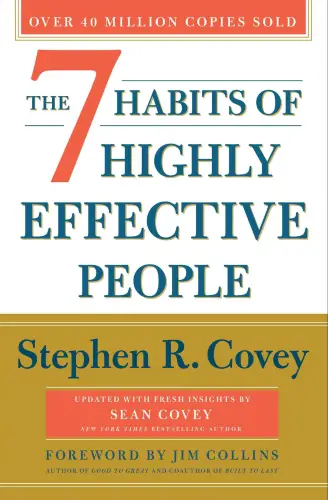The 7 Habits of Highly Effective People
Book Author: Stephen Covey
Summary reviewed by:
Terrence Timmons
Terrence Timmons
Analyst
Bachelor of Arts (BA), University Of California, Santa Barbara 2019
With over 4 years of experience as an analyst. Terrence Timmons is committed to analyzing summaries without compromising on quality.
The 7 Habits of Highly Effective People: Summary
Unlock the secret to unparalleled personal and professional effectiveness! Stephen R. Covey's masterpiece, "The 7 Habits of Highly Effective People," isn't just a book; it's a transformational journey that has empowered millions worldwide. Drawing upon decades of experience as a renowned leadership authority, Covey combines rich insights from psychological research with timeless wisdom to present a holistic, principle-centered approach for solving personal and professional problems. This seminal work stands out not only for its credible foundation—anchored in Covey's extensive consulting, teaching, and leadership development experience—but also for its profoundly practical nature, making the attainment of effectiveness both realistic and achievable for readers from all walks of life.
At the heart of Covey's thesis is the belief that true effectiveness is attainable not by altering the external outcomes but by transforming oneself from the inside out. The book meticulously outlines the transition from dependence to independence (self-mastery) and finally to interdependence (collaborative success), guiding readers through a paradigm shift that aligns their perspective and behavior with universal principles of effectiveness. Covey's approach is not about quick fixes or shortcuts but focuses on developing a character ethic that leads to sustainable success.
The 7 habits, each a chapter unto itself, serve as a roadmap for personal growth and challenge overcoming. They begin with "Be Proactive," emphasizing the power of taking responsibility for one's actions, and culminate in "Sharpen the Saw," which advocates for continuous self-renewal in four dimensions: physical, social/emotional, mental, and spiritual. Each habit is illustrated with vivid examples, demonstrating their applicability in both personal and professional contexts.
Covey doesn't just theorize but provides readers with actionable tools and exercises to integrate these habits into their daily lives. These include personal reflection, planning techniques, and interpersonal strategies, all designed to foster self-awareness, discipline, and empathy, thereby enabling readers to navigate life's challenges with grace and achieve their ultimate potential.
The 7 Habits of Highly Effective People: Genres
Non-fiction
Self-help
Personal Development
Business
Leadership
Psychology
Business & Economics
The 7 Habits of Highly Effective People: Themes
Personal Responsibility and Proactivity: Covey posits that taking responsibility for one’s own life is the cornerstone of being effective. By choosing our responses to the circumstances around us, we exercise the fundamental principle of personal vision.
Principle-Centered Living: The book emphasizes aligning one’s actions with timeless, universal principles such as integrity, honesty, and human dignity, suggesting that this alignment is key to achieving lasting effectiveness.
Personal Vision and Leadership: Covey introduces the concept of beginning with the end in mind, encouraging readers to envision their personal and professional goals clearly as a step toward achieving them.
Interpersonal Effectiveness: The importance of creating win-win situations, understanding others deeply before seeking to be understood, and synergizing with others to achieve goals that wouldn’t be possible individually.
Continuous Improvement: The idea of “Sharpening the Saw” revolves around continuous self-renewal in the physical, social/emotional, mental, and spiritual domains, advocating for a balanced, holistic approach to personal development.
The 7 Habits of Highly Effective People: Methodology
In writing this book summary, our focus was on delivering a user-centered narrative that mirrors the insightful depth of Stephen Covey's work. We embarked on a journey of expert analysis, delving deep into the essence of "The 7 Habits of Highly Effective People," ensuring every theme from personal responsibility to continuous improvement was explored with the precision it deserved. Our aim was to synthesize these complex ideas into a digestible format that not only informs but empowers you to apply Covey's principles to your daily life. Through meticulous examination and a commitment to quality, we've crafted a summary that upholds the integrity of Covey's transformative message.


The 7 Habits of Highly Effective People
Date Published: August 15, 1989
Disclaimer: As an Amazon Associate I earn from qualifying purchases.




